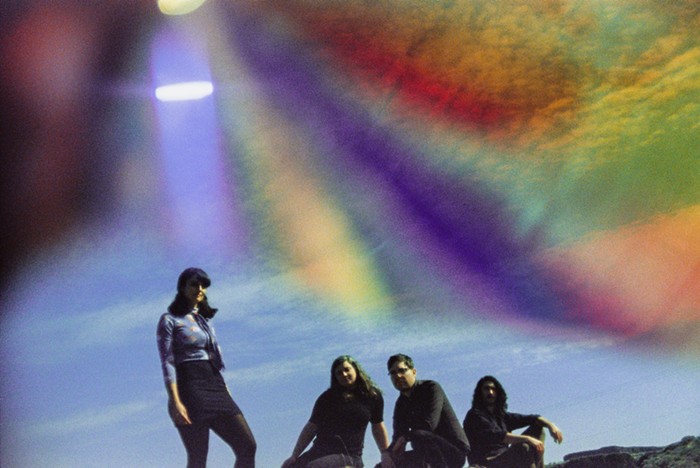The year is absurdly young right now, but I'm calling it: Light Show by LA musician/producer Jack Name is going to be one of the rock albums of 2014. Its 12 tracks skitter and slither by in 29 minutes, but their strange tonal aura and off-center yet addictive melodic flavor demand repeat plays. Like some of the best releases from the Ralph Records roster, Light Show teems with subliminal details that may make sense only under the influence of mind-altering substances.
Jack Name is the nondescript alias of a sonic eccentric with sweet connections in LA's fertile subterranean-rock anti-scene; he's pals with Ariel Pink and played shows with the glo-fi progenitor before anyone gave a damn about him. Name also plays guitar for White Fence when that brilliant psych band tours. For the record, Jack Name's website is johnwebsterjohns.com, but nothing is sure in his world. "I'll probably have 20 more names I'll want to try on," Name says in a phone interview, his low, slow delivery at odds with his frenzied, high-pitched singing style. "There's no strategy behind it. It's just weird indecisiveness and a lack of respect for my lineage."
Name's résumé includes stints with the Charlemagnes and Fancy Space People—groups so low-profile they don't even have Discogs pages—and working solo as Fictional Boys and Muzz. All the while in his Rampart Village pad, he was working on the songs that form Light Show, which Ty Segall's Drag City imprint God? just issued.
The songs on Light Show have a spontaneous feel. They never outstay their welcome, either; they're concise. However, Name admits that he spent much time working on the songs' details, "but not in a Steely Dan way. I don't know if this is too romantic-sounding, but it's like the idea that there's a sculpture in the rock, so you just carve the thing out of the rock. It's that same kind of idea. I know that there's something there that I want to have, and I can tell if I play a certain bass note and it sounds too something, I'll spend a bunch of hours locked in my room just doing bass stuff until I figure it out. That's where I have fun making music: being picky and meticulous."
For Light Show, Name used a mix of tape machines of various sizes and Max/MSP software programs, a weird blend of low and high technology. He deployed six different drummers and two vocalists: Jamie Phillips and Nora Keyes.
Generally speaking, Light Show starts in manic/panic, euphoric mode and then gradually decelerates into eerie, morbid atmospheres, with Name's oneiric, hazy production in the service of jittery inventiveness. Much of the album consists of familiar-sounding rock that's alchemized and coated in a tantalizing otherness, like a slightly more rock-infatuated Residents. "Pure Terror" could be an alternate-universe hit single, a lilting charmer somewhere between "Car Wash Hair"–era Mercury Rev and Olivia Tremor Control. It makes you want to fly into the sun.
Shadows recur often in Light Show's lyrics. Turns out that the album's central conceit is a struggle between two gangs: the Shadows and the Woolie Boolies. Name explains: "The Woolie Boolies are obsessed with putting light on things and making it so that everything is visible or under surveillance or balanced or accounted for. The Shadows are against this. They're into the idea of negative space. They're being oppressed by the Woolie Boolies. At the point that the story starts, they're exiled, living out in the badlands. They're almost religious beliefs related to this concept of shadows and mystery—as a good thing. And then there are oppressors who see it the opposite way."
The strangeness extends to "My Own Electric Ladyland," an urgent, staccato gush of feisty guitars and helium vocals somewhere between Ariel Pink and Ween, in which one of the Shadows talks about being stuck inside the cover of Jimi Hendrix's Electric Ladyland LP (all those nekkid women) and how stressful that is. "For the Shadows, dreams are a way of divination," Name says.
Light Show ends with "Killing a Shadow," an eerie, delicate ballad. Name and Phillips sing, "We opened you up and filled your body with light," and it sends chills like "Willow's Song" does in cult British film The Wicker Man. "The war's over, so to speak," says Name, "and the Shadows have lost. One of them wakes up in some kind of shitty hospital rec room with a bunch of people singing a mind-numbing song to him."
So, not a Hollywood ending, then. You can think of Jack Name as the antithesis of plastic Southern California culture, a catalyst for LA's thriving, eldritch sonic underbelly. He instinctually knows that the most interesting stuff happens in the shadows. ![]()




















